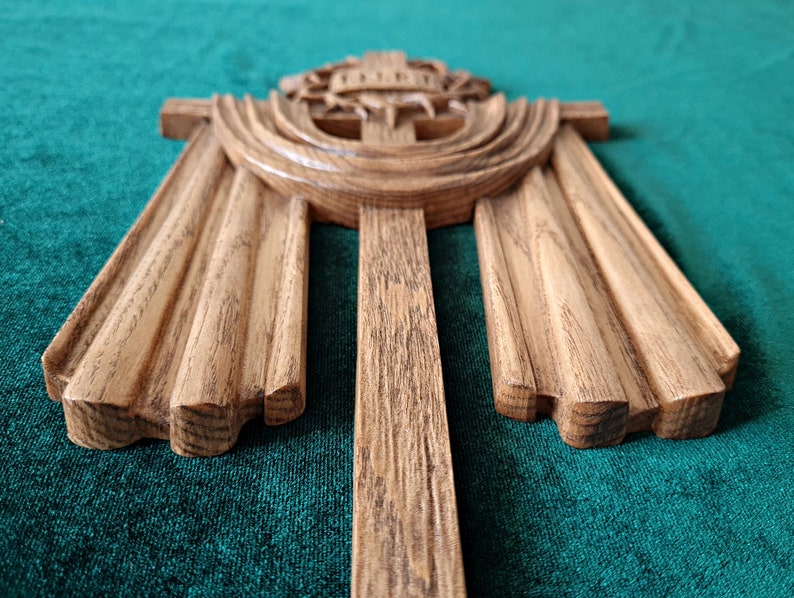News
How Handmade Wooden Crosses Are Shaping Sustainable Consumer Choices
As the world grows increasingly aware of environmental challenges and the importance of ethical consumerism, handmade products like authentic carved wooden crosses are becoming pivotal in guiding sustainable consumer decisions. Consumers are actively seeking items that reflect their values of environmental stewardship, fair trade, and support for local artisans. Handmade wooden crosses provide an ideal solution to these demands, promoting sustainability, minimizing environmental impact, and fostering a more intentional approach to consumption. This trend towards handmade religious décor is part of a larger movement where sustainability and craftsmanship coexist harmoniously.
1. Reducing Waste and Overproduction
Mass-produced religious items often lead to overproduction, resulting in significant waste. In contrast, handmade wooden crosses are typically crafted in limited quantities or made-to-order, which significantly reduces waste and sidesteps the issues associated with large-scale manufacturing. Artisans use only the necessary materials, and many incorporate recycled or repurposed wood into their creations. By decreasing the reliance on mass production, handmade wooden crosses help lower industrial waste, making them a more environmentally friendly choice for consumers.
2. Sustainable Materials and Practices
Authentic carved wooden crosses are usually made from solid hardwoods like teak, known for their durability and sustainability. Artisans prioritize using eco-friendly materials such as reclaimed wood and plant-based finishes, ensuring that their products leave a minimal environmental footprint. Additionally, many artisans employ low-impact production methods that consume less energy compared to factory-based manufacturing. These sustainable practices resonate with the growing trend of eco-conscious consumerism, where buyers aim to make responsible choices that benefit the planet.
3. Supporting Local Economies and Fair Trade
Purchasing handmade wooden crosses offers consumers the opportunity to support local economies. When consumers buy these handcrafted items, they directly contribute to the livelihoods of artisans and small business owners, both locally and internationally. This support goes beyond financial transactions by preserving traditional craftsmanship, cultural heritage, and artisanal skills passed down through generations. In many instances, artisans in developing regions adhere to fair trade practices, ensuring they receive fair wages and work under humane conditions, further aligning with ethical consumer values.
4. Craftsmanship and Durability
Handmade wooden crosses are designed with longevity in mind. Each piece is meticulously carved, reflecting the time and effort invested by the artisan, resulting in durable and timeless décor. This contrasts sharply with the disposable nature of many mass-produced items, which are often cheaply made and intended for short-term use. The enduring quality of handmade wooden crosses means they can be cherished for years, reducing the need for frequent replacements and ultimately lowering the environmental impact associated with continuous consumption.
5. Mindful Consumerism
Handmade wooden crosses encourage a more mindful approach to purchasing. When consumers choose these handcrafted items, they are often selecting pieces that hold personal significance or tell a meaningful story. This is a departure from the impulse-buying behavior common in mass-market retail. By fostering a deeper connection between the consumer and the product, handmade wooden crosses inspire more thoughtful purchasing decisions. Buyers take the time to appreciate the craftsmanship and the unique value of each piece, leading to a more intentional and sustainable approach to consumerism.
6. The Role of Technology in Promoting Sustainability
While handmade wooden crosses are rooted in traditional craftsmanship, technology plays a crucial role in connecting consumers with these sustainable options. Online marketplaces and social media platforms make it easier than ever for eco-conscious shoppers to discover and purchase handmade crosses from around the world. Artisans can leverage digital platforms to showcase their sustainable practices, share the stories behind their creations, and educate consumers about the environmental benefits of choosing handmade items. This technological integration opens up new avenues for artisans to reach a global audience, further advancing the sustainability movement.
7. Upcycling and Repurposing Materials
Many artisans who create handmade wooden crosses excel in upcycling and repurposing materials, transforming what might otherwise be waste into beautiful, functional items. Using reclaimed wood not only reduces the demand for new resources but also adds a unique character to each cross. This approach highlights the innovative potential of sustainable craftsmanship, demonstrating how creativity can turn discarded materials into valuable religious décor. Consumers who prioritize eco-friendly choices are increasingly drawn to these upcycled products, which offer a distinctive blend of artistry and sustainability.
8. The Impact of Handmade Wooden Crosses on Religious Décor
The religious décor industry, much like the fashion industry, has faced criticism for its environmental impact, particularly with the prevalence of mass-produced items. However, the handmade movement offers a sustainable alternative to these bulk-produced religious symbols. Artisans crafting handmade wooden crosses focus on quality and sustainability, using materials that are both durable and environmentally responsible. These crosses are designed to last and transcend fleeting trends, encouraging consumers to invest in meaningful, long-lasting pieces that reduce the cycle of overconsumption. By choosing handmade religious décor, consumers actively support a more sustainable and ethical industry.
9. Conclusion
Handmade wooden crosses are more than just decorative items—they symbolize a shift in consumer values towards sustainability, ethical practices, and mindful consumption. As more individuals seek out eco-friendly and socially responsible products, handmade crosses are becoming an integral part of the solution. By supporting artisans, minimizing waste, and opting for high-quality, durable items, consumers can make a positive impact on the environment and contribute to a more sustainable future. Handmade wooden crosses embody the principles of sustainability, craftsmanship, and intentional consumerism, making them an increasingly popular choice for those looking to align their purchases with their personal values.
This article underscores the significant role that handmade wooden crosses play in fostering sustainable consumer choices, from reducing waste and supporting artisans to promoting eco-friendly practices.

